Alisha and David Make Your Pasta
In conversation with Alisha Bennett of Your Pasta
Alisha Bennett and David Kaplan always dreamt of opening a restaurant together. The couple’s relationship was founded on a shared love of food after they first met while working in the hospitality industry in 2014. They had plans to move from New York to California, start a family, and launch their own concept—but then the pandemic hit.
“Grocery shelves were empty,” Alisha remembers of March 2020. “There was nothing to be found anywhere. So Dave was like, ‘What's something that we can make together that people will always want? That people are always going to need, no matter the circumstance?’ We knew we still wanted to be business owners together, but at that point in time, there was no way we were going to open a restaurant.”
Instead, the duo created Your Pasta, a small, sustainability-minded dried pasta company that plays to both of their strengths. David is responsible for making the pasta, a craft he mastered during his three years running the pasta room at Misi in Williamsburg, while Alisha focuses on the business of it all. She also works full-time as a public school social worker. Here, she talks about developing a food brand and juggling multiple jobs with motherhood.
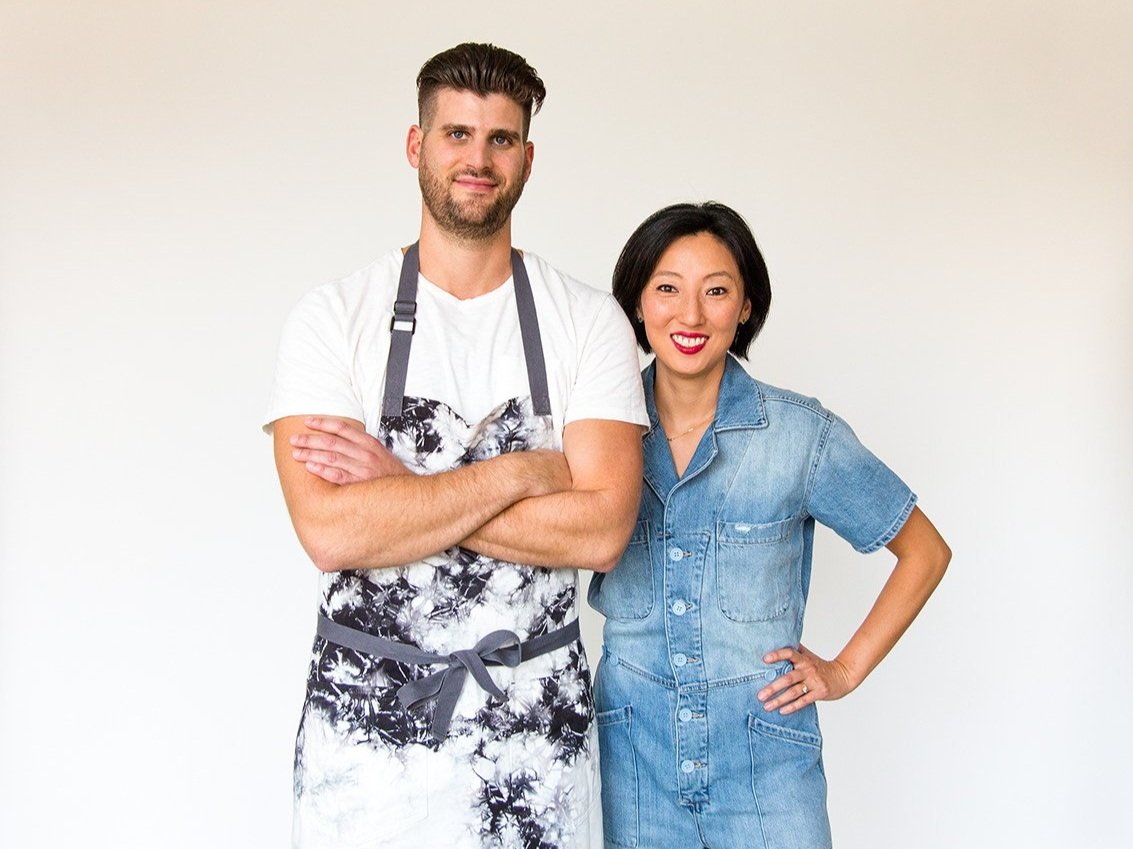
Mast Journal: What is special about Your Pasta?
Alisha Bennett: When we were talking about the ideas behind it and the sort of business we wanted to run, it was important for us to make a really great tasting pasta, but also to think about really eye-appealing packaging that is completely plastic-free and low-impact. So that was what we set out to do.
We also wanted to give back to our community, so part of our business model is we work with a local New York City organization called the Black Chef Movement. We provide monthly pasta donations to them and then they make it into meals and distribute those meals to people all over the city as part of their Fill the Fridges Initiative. We also donate 5% of our annual revenue to some organizations that are really important to us.
MJ: That’s amazing.
AB: And our pasta is all small batch-made in Brooklyn. We source our flour domestically. We learned that the pastas we're familiar with from grocery stores that say they're made in Italy actually source flour from the States and mix it with flour in Italy. So it is a product of Italy, but a lot of their wheat is being imported from the United States to Italy. The pasta is then being made in Italy and imported back into the States.
So we wanted to really make sure that we were sourcing our flour domestically and that it would be organic. Our flour is sourced from North American farms, since another really important part of this business was to lower the environmental and carbon emissions of pasta production.
MJ: That’s so interesting. How did you find farms to work with?
AB: We reached out to various distributors until we found Greg, who works for Quality Organic. And my understanding of his business is he oversees the organic certification of the flour that we use. So we were initially using flour out of North Dakota. They stopped making organic flour and so he actually was able to help us find another U.S.-made, organic-certified, USDA-certified semolina flour.
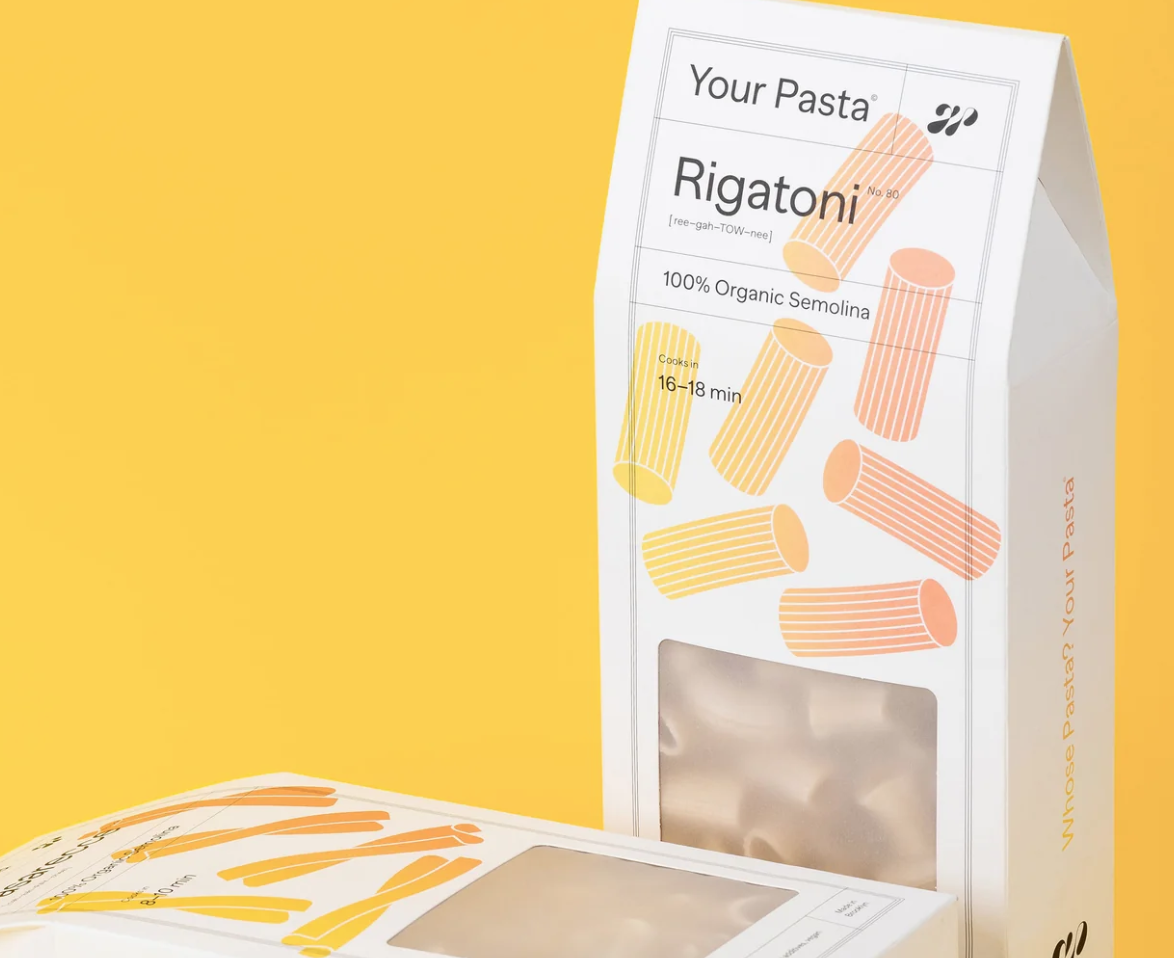
MJ: And how did David develop the recipe for the dried pasta? Since he was working with fresh pasta at Misi, right?
AB: Yes. So Your Pasta is two ingredients, which is also something we really pride ourselves on. It's really just organic flour and water. And then the part that makes it shelf stable is the drying process. That has been one of the biggest works-in-progress for Dave, who is the pasta maker and dryer and packager and distributor right now.
He uses equipment from Arcobaleno in Pennsylvania. And he's had a lot of conversations and a lot of trial-and-error in figuring out what is the right amount of drying time. It's a very specific window. So we've had a lot of batches that have been donated and sent to different organizations because of the complications of the pasta drying process.
MJ: That sounds challenging!
AB: Before the pasta is dried, it's extruded through bronze dye. A bronze dye adds more texture to the pasta.
MJ: Got it. And how did you decide on the name of the brand?
AB: We really wanted to make sure that this product was not about us because it's not about us. The idea of putting our name on it just was not what we wanted. We wanted to take ego completely out of this product. It’s also a domestically made and sourced pasta and neither of us are Italian, so giving it an Italian name was not something that we wanted to do. So when we were having conversations about who this pasta is for, we realized it's for our consumer. It's your pasta. You buy it and it's actually your pasta. So that’s just the name we settled on.
It was something that came out of the pandemic and being locked down and being pregnant. There was not a lot of opportunity for joy and comfort in those early spring months of 2020. Pasta was one of those things that we were able to share together and brought us comfort. And so one of the things that we talked about, too, was this pasta is for you to have in your kitchens with your friends and family because it is Your Pasta.
MJ: It’s a perfect choice! And what about the aesthetic of the brand?
AB: We worked with a graphic designer that was a friend-of-a-friend. We wanted to create something that was aesthetically pleasing. A lot of pasta boxe on the shelf are not that cute. They have these very dark blue or red tones and they all have the wheat image on it. They look like an older product.
We wanted to attract people to our packaging. It's light and colorful, but not too overwhelming. We loved the graphics of the actual pasta shape. We were initially going to go with no window, but then we were able to find a plastic-free window solution. So although it's not a hundred percent clear, it’s completely plastic-free. And making our entire package recyclable, compostable, and biodegradable was important for us.
MJ: The cloudy window looks cool! It’s very contemporary.
AB: Dave had feelings about the translucent cloudiness, but I did not. I think it's great because you can still see the shapes. The pasta is still visible. And we care more about the environment and not creating another single-use plastic that's not even recyclable than having a clear window. It was not negotiable. It was either no window or the theta paper window.
MJ: Totally. Where did this commitment to environmentally-friendly packaging come from?
AB: I just don't—ethically, morally, as a human—feel good about creating something that is not helpful or productive for the environment we’re living in. There are moments where it seems like the world is literally melting. And if we're going to create a consumer product, we need to make sure that the packaging is low-impact. I know we're not Barilla and we're not in all these nationwide grocery stores, but it's still important for us to be an environmentally-conscious company.
MJ: Definitely. The planet doesn’t need any additional single-use plastic. Where can shoppers find Your Pasta, aside from on the website?
AB: We are in some stores. Obviously, we're in Mast Market, as well as other small provisions shops like Marlow & Daughters and The Meat Hook. And we're trying to expand into more of these low-impact or zero-waste grocery stores. We're at a place in Geneva called Marilla’s Mindful Supplies, which is a refillable store. So we actually send them pasta in bulk and then people can bring in their own bags or jars and buy our product on a refillable basis.
MJ: That sounds cool. What shapes are you currently offering?
AB: We launched with casarecce and rigatoni. That's currently what we have, both packaged and in bulk. We’re hopefully going to launch two new shapes by early fall.
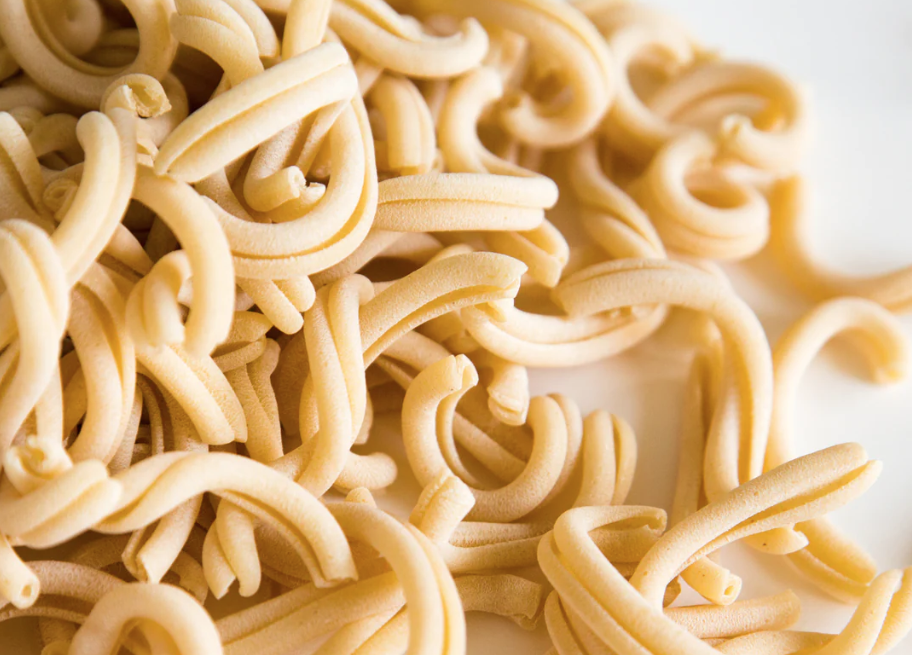
MJ: What has the response been to those two shapes so far?
AB: Casarecce is the fan favorite. Rigatoni does really well also, but it's a heartier, thicker, chewier pasta. The ingredients are exactly the same, so the actual taste of the pasta is going to be the same. But with the casarecce, there's something people really like about the shape of it and how it eats and how it mixes with sauces.
MJ: That makes sense! And what is it like juggling Your Pasta with your full-time job?
AB: I am a full-time school counselor in New York City public schools and then I'm also a therapist part-time. So Your Pasta is actually my second part-time job. And I’m a mom of a three-year-old. People ask me how I do it all and I don't really know. I come to work in the morning and I'm usually done at school between 3 p.m. and 5 p.m. I go home and I mom for a couple hours until bedtime. And then after she goes to bed is usually when Dave and I have work conversations or get to-do list tasks done or I get on a session with a client for my private practice. It helps that I have the unwavering support of my husband and business partner, as well as Brenda, our child’s nanny, who is the most incredible caretaker.
MJ: Wow, that’s a packed schedule.
AB: Some days can be very long, but some days are easier. When the days are really exhausting, you just get through it.
MJ: Are there overlaps between your different jobs?
AB: The number one thing that I've learned as a counselor and as a therapist that overlaps with being a business owner is communication. And just being a human being. I pride myself on honesty and genuineness, as a person that interacts with children all day and is taking care of people's emotional health. It's part of who I am. The same set of skills around honesty and transparency and how you interact with people are relevant to running a business.
MJ: One hundred percent. And what is your favorite dish to eat with Your Pasta?
AB: Probably Genovese. I'm not the cook in my family, but essentially Dave braises the meat with a ton of onion for over 24 hours to make the sauce. It's incredible. So I would say either that or amatriciana, which is a red sauce with guanciale.
More from The Journal
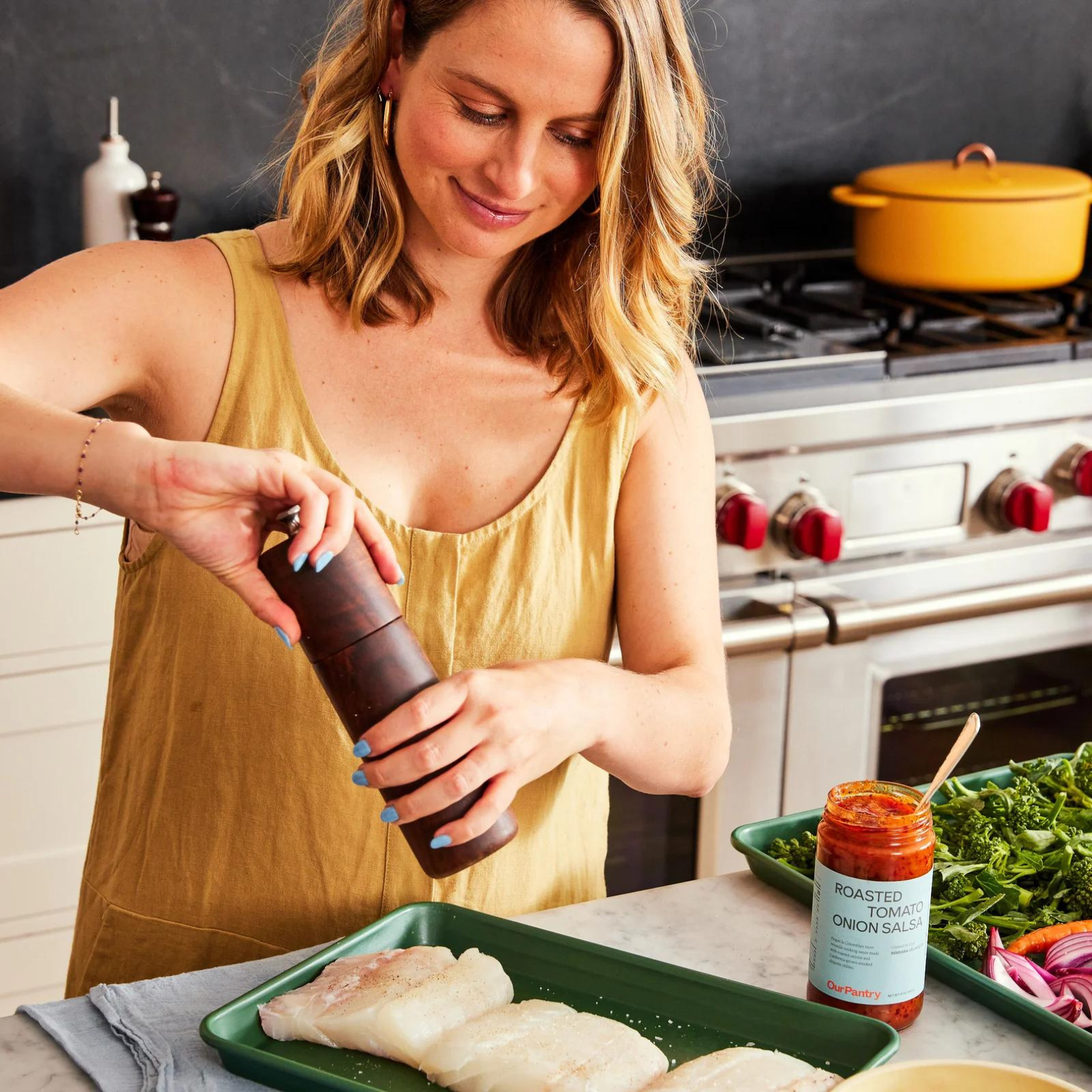
Carolyna Shares the Secret Sauce
Carolyna De Laurentiis, founder of Our Pantry, shares her story, collaborative culinary process, and passion for simple yet exquisite ingredients.
Read more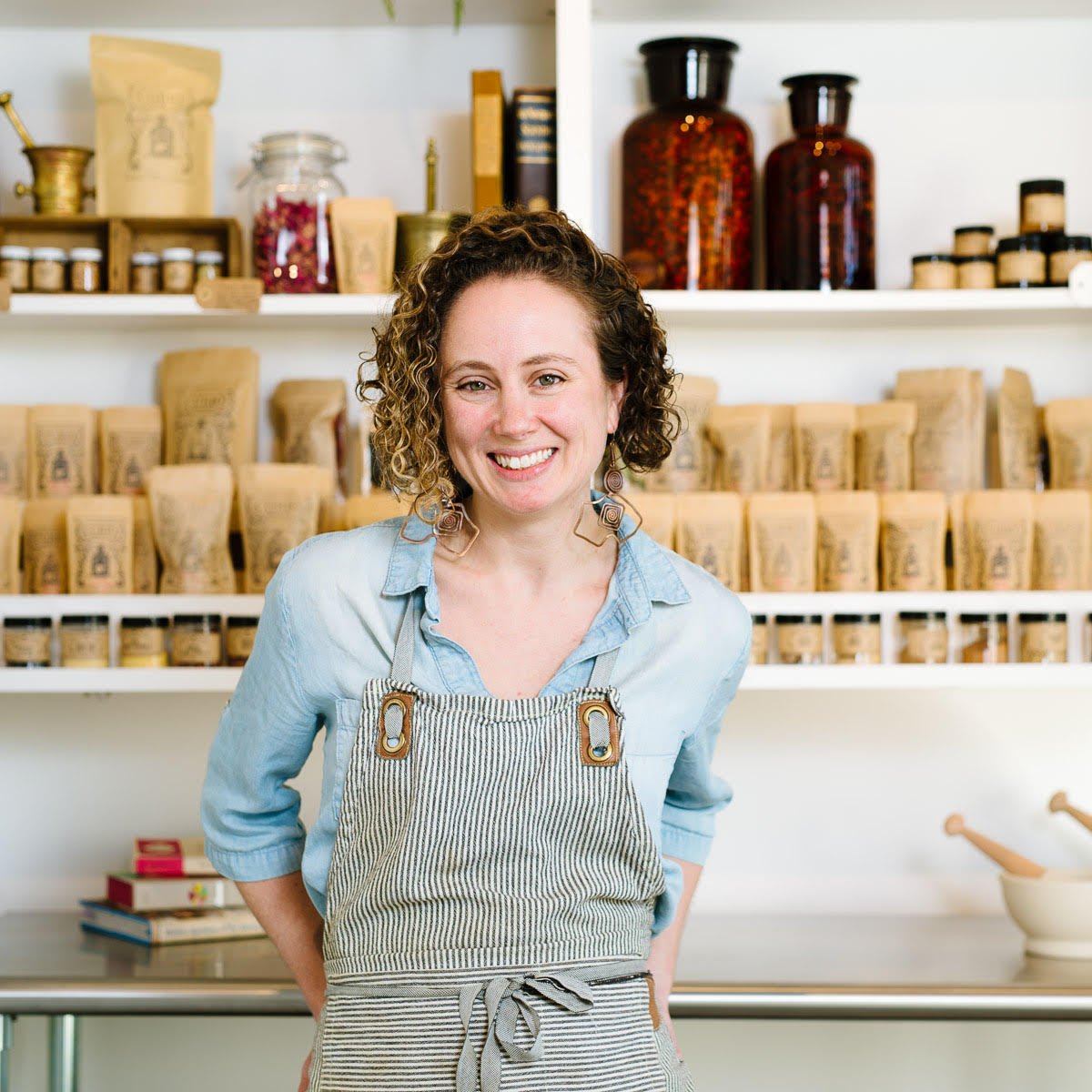
Getting Spicy with Claire Cheney
In conversation with Claire Cheney, founder of Cambridge based Curio Spice Co., a mission driven, woman-owned, world class spice importer and blender.
Read more